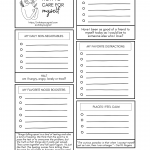A Grief Care Plan: Your Foundation for Support
/ Coping with Grief : Litsa
For further articles on these topics:
We have hundreds of articles on this site with thousands of ideas for living life after loss. But today, after more than ten years of writing for What's Your Grief, I realized there is a glaring oversite in this grief support library. There is something I ask every single grieving person I work with individually to do, pretty much first thing. And yet I have never once mentioned it here. So whether you have been following What's Your Grief for a week or a decade, today is the day we're asking you to create your grief care plan. Something so simple, that we should have suggested a long time ago!
But first, some background.
When people seek out grief support they often assume it will be all about processing emotions and digging into the mess of hopelessness, anger, guilt, despair, and all the other muck. So it often comes as a surprise when we start by talking about things like eating, sleeping, talking with friends, showering, getting off the couch, and going outside. In fact, sometimes people get quite frustrated when I want to know all the details of their daily routine and when I keep checking in about it. They say things like "this doesn't feel important enough to spend time on".
How We Spend Our Days
What people often don't realize is, in some ways, those are the most important things. They are the foundation on which everything else rests. We can dive into all the other grief-muck, but if those underlying building blocks are crumbling, we're probably going to spin our wheels.
Annie Dillard has a quote in The Writing Life that I have always loved:
“How we spend our days is, of course, how we spend our lives. What we do with this hour, and that one, is what we are doing. A schedule defends from chaos and whim. It is a net for catching days. It is a scaffolding on which a worker can stand and labor with both hands at sections of time. A schedule is a mock-up of reason and order—willed, faked, and so brought into being; it is a peace and a haven set into the wreck of time; it is a lifeboat on which you find yourself, decades later, still living.”
― Annie Dillard, The Writing Life
Perhaps I've always loved this quote because I realize just how aspirational it can feel. As someone with ADHD, a schedule and routine can feel nearly impossible some days. Chaos and whim are my comfort zone. Figuring out how to create the 'net for catching days' is not something that ever came naturally to me. Which is exactly why I value it so deeply. I know all too well what life looks and feels like without it. I also know what a tremendous difference it makes when that foundation is in place, however difficult it is to create and maintain.
In grief, our scaffolding often disappears. Even those to whom "mock-ups of reason and order" have always come naturally can find them collapsing. A good night's sleep is a distant memory. Getting to the gym feels pointless. Routine calls to friends and family disappear in favor of total isolation (save the UberEats delivery driver). 3am television, four-hour naps, canceled plans, and days of forgetting meals are the new normal.
Why Create a Grief Care Plan?
The grief care plan is a nod to how ugly day-to-day life can look after loss. Sure, we need to create space to sort through anger and guilt and existential despair. But we also need to figure out how to get through the day and take care of ourselves. And grief means that sometimes we've literally forgotten how to take care of ourselves.
Grief hurts our memory and it enhances our negativity bias. We forget who is there to support us. We're at a loss when it comes to remembering the places and things that might help us feel better. It's 5pm on a Sunday and we haven't showered or gotten dressed or eaten a full meal. And yet we're convinced there is not one single thing we could possibly do that would improve the day.
This is an especially cruel symptom of grief because it means, in the moments we need them most, we are least able to recognize and mentally access the tools that might help us.
This is why creating a care plan is so important. It is something physical and tangible that we complete in a brighter moment so we can look at it in the darkest moments. Yes, it will feel basic. But in rebuilding a life after loss, re-establish the basics matters.
So What is a Grief Care Plan?
The plan is just a single sheet you fill in with reminders about the non-negotiable routines you've set for your days, along with the people, places, and things that can help you when grief has you pinned to the couch for days. Or when your rumination is so overwhelming that you fear you'll never get out of it. Or when you feel totally isolated.
I like to think of the grief care plan as an interruption tool. Grief brain is real. Grief lies to us sometimes. It makes us feel completely hopeless and alone. A care plan won't erase the hardest feelings of grief. But seeing the care plan pinned to your fridge or pulling it up on your phone when you can't think of a single thing that could help to shift your day can be just the interruption your grief brain needs. It can be a reminder that you aren't as alone as you feel. It's a reminder that there are some things within your control. It can be the push to try one thing that you haven't tried today, just to get you off the couch or to get your brain just a bit unstuck.
The Non-Negotiables
The first section of the care plan is the "non-negotiables". These are the basic things that you know you need to do every day in order to be baseline functioning well. They are things you might think of as 'routine'. But on the worst days of grief, they are the things that can easily slip. Seeing them on the list can be a reminder that you skipped them and it might be contributing to how hard the day feels.
These are not aspirational things. Don't put "go to the gym" on there because you want to go to the gym every day. This is for things more like "take a shower" and "get 30 minutes of sunlight/daylight".
HALT Check-In
The care plan has a "HALT" check-in, asking you if you're hungry, angry, lonely, or tired. Why? Because these are all states that make it harder for us to function, problem-solve, and make self-compassionate choices. They come from the field of substance abuse, as they are physical and emotional states that can trigger avoidance coping. But checking in with ourselves and addressing them can help us to pick other types of coping.
Grief Care Plan Mood Boosters
What boosts mood is different for all of us. For me it is things like rolling around on the floor with the dog, watching The Office bloopers and outtakes, walking barefoot in the woods, and - of course - watching Usher's Alphabet Song. For you, it might be seeing a movie in the theater and cat videos and gardening and watching compilation videos of your favorite football team's greatest plays. All that matters is you come up with a list of different things (make sure they aren't all dependent on nice weather - you need at least a few for days the sun isn't shining) that you know boost your mood, even if lately you've felt disconnected from them.
People Matter
Grief is frighteningly isolating sometimes. When you're down, it can feel like you are completely alone. In reality, it is usually a combination of not having the person we want (aka the person who died or disappeared from our life) and not reaching out to the people we can connect with. So this one is pretty straightforward - who are the people you can reach out to? Maybe they are friends, family, your pastor, your neighbor, your counselor, the WYG grievers community? Even if they seem obvious, list them out. Because in our darkest moments, it helps to see them written out. It also helps to use them as a little checklist, reminding you that if you haven't reached out to each of the people on that list, you haven't yet done all the things that are in your control.
Remember, this isn't about people who are going to fix our grief or understand everything we're going through. No one can fix our grief or understand everything we're going through! What people can do is sit with us through those things, reminding us that we don't have to shoulder all of the weight alone.
Grief Care Plan Distractions
The reality, in grief and in life, is that sometimes you just need some healthy distractions. There are times our brains just need a break. Grief can be exhausting and can feel relentless. One of the reasons we love the Dual-Process Model of Bereavement is because the highlight that the nature of grief is that sometimes we are deeply "in" our grief while other times we need some healthy avoidance. When rumination has our mind spinning or grief has us totally depleted, an interruption that can keep it occupied might be just what the doctor ordered. Maybe it is video games, jigsaw puzzles, crossword puzzles, podcasts, reading a good mystery, art, or doing some hands-on volunteer work in your community. Whatever you know helps to distract you.
Grief Care Plan Places You Feel Calm
When we're having an especially bad grief day, it can be easy to know rationally that getting out of the house might be a good idea. But it can be very hard to find the motivation and figure out where to go. Sometimes a little reminder of the places that bring us some calm helps with that push to move us out the door. Maybe it is the library or a local coffee shop. Perhaps it is a park. For me, it is a nice, dark movie theater (especially in the middle of the day) and my favorite garden and nursery shop. Random? Yes. But that doesn't matter. It doesn't need to work for anyone else. It only needs to work for you.
Other Resources
At the bottom of the care plan we've listed a reminder about our website and the 988 crisis line, two resources that you can access 24/7 for a little support. But we've also included two extra spots for you to list resources you know help you. No rules - just any support resource that you know it might be good to remember exists in the deepest darkest moments.
Download the Grief Care Plan
There is no formal way one has to do a care plan - you can just jot it down on notebook paper or make a note in your phone. But we have a PDF you can download to print and fill out or you can download a fillable pdf.
Fillable PDF:
We wrote a book!
After writing online articles for What’s Your Grief
for over a decade, we finally wrote a tangible,
real-life book!
What’s Your Grief? Lists to Help you Through Any Loss is for people experiencing any type of loss. This book discusses some of the most common grief experiences and breaks down psychological concepts to help you understand your thoughts and emotions. It also shares useful coping tools, and helps the reader reflect on their unique relationship with grief and loss.
You can find What’s Your Grief? Lists to Help you Through Any Loss wherever you buy books:






Catherine M May 22, 2023 at 11:00 am
I’m coming up on the 1st anniversary of my husband’s death in July. I was always one to create lists and I managed to create and follow through with my “need to do” lists through November of last year but since then I’ve struggled beyond measure. I knew the holidays would be difficult but I was totally unprepared for spring. I felt like I came out of the tunnel of grief in March only to relive the time we spent together last year leading up to his unexpected death (Grade 4 Glioma)
We were married 3 months shy of our 43rd wedding anniversary (which happens to be my birthday as well). He was the kindest man you’d ever want to meet and our marriage was the greatest of all loves.
I have a wonderful support group of friends who have lost their spouses to cancer. My grief counselor at the Cleveland Clinic has been a godsend all along with the virtual groups I regularly attend.
This article couldn’t have come at a better time because even though I feel supported in my journey I feel locked up in my day to day life.
This is a journey I would not wish on my worst enemy. It is nothing I could have ever prepared myself for emotionally.
I love you Michael. I will always love you
Kelley H May 19, 2023 at 1:10 pm
I am one of those people who feels like my foundation started crumbling & hasn’t stopped. Just continues to break down. It doesn’t help that I have chronic debilitating medical problems that keep me in bed much of the time. I also am depressed & have been for years, while no meds help anymore after 40 years. My husband & I are barely surviving financially, necessities only, like millions of others, I know. I only want to be in bed as I have nothing to look forward to ~ no reason to be up.
Barbara K May 18, 2023 at 6:44 pm
I lost my husband on April 1, 2023 from Glioblastoma, a terminal cancer. To complicate matters I fell and fractured my femur and it coincided with his last month of life. After 10 weeks I have just been given permission to start using a cane and practice using brake and gas pedals in my car to start driving. My world is tiny tiny as I cannot get out much. I am shattered and need help. My friend Pam gave me this web site as it helped her through her grief after the loss of her husband a number of years ago. I hope this site helps me. I am trying to structure my life, but it is difficult. As everyone I know who has been through this has told me.